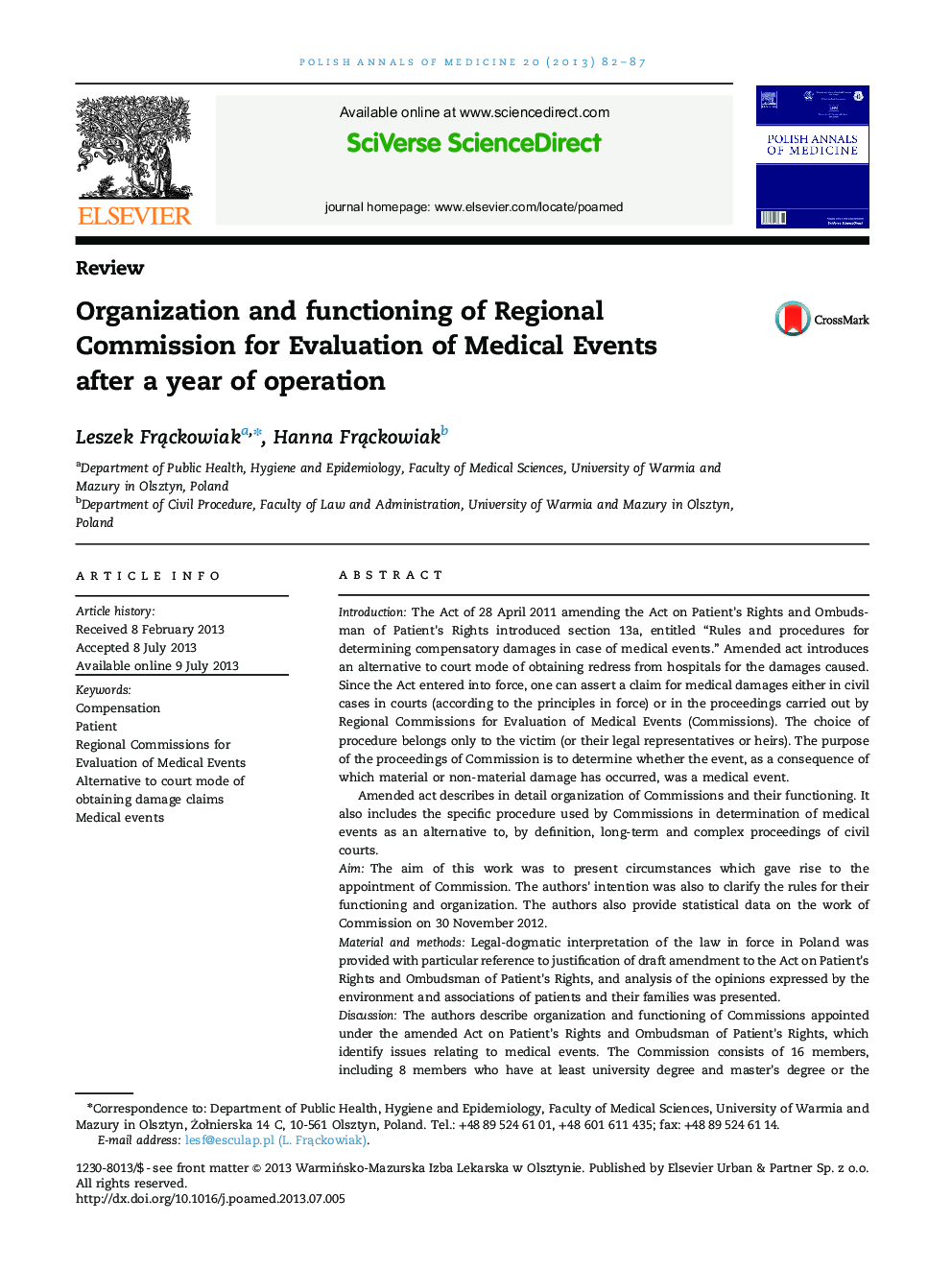| کد مقاله | کد نشریه | سال انتشار | مقاله انگلیسی | نسخه تمام متن |
|---|---|---|---|---|
| 2678741 | 1564456 | 2013 | 6 صفحه PDF | دانلود رایگان |
IntroductionThe Act of 28 April 2011 amending the Act on Patient's Rights and Ombudsman of Patient's Rights introduced section 13a, entitled “Rules and procedures for determining compensatory damages in case of medical events.” Amended act introduces an alternative to court mode of obtaining redress from hospitals for the damages caused. Since the Act entered into force, one can assert a claim for medical damages either in civil cases in courts (according to the principles in force) or in the proceedings carried out by Regional Commissions for Evaluation of Medical Events (Commissions). The choice of procedure belongs only to the victim (or their legal representatives or heirs). The purpose of the proceedings of Commission is to determine whether the event, as a consequence of which material or non-material damage has occurred, was a medical event.Amended act describes in detail organization of Commissions and their functioning. It also includes the specific procedure used by Commissions in determination of medical events as an alternative to, by definition, long-term and complex proceedings of civil courts.AimThe aim of this work was to present circumstances which gave rise to the appointment of Commission. The authors' intention was also to clarify the rules for their functioning and organization. The authors also provide statistical data on the work of Commission on 30 November 2012.Material and methodsLegal-dogmatic interpretation of the law in force in Poland was provided with particular reference to justification of draft amendment to the Act on Patient's Rights and Ombudsman of Patient's Rights, and analysis of the opinions expressed by the environment and associations of patients and their families was presented.DiscussionThe authors describe organization and functioning of Commissions appointed under the amended Act on Patient's Rights and Ombudsman of Patient's Rights, which identify issues relating to medical events. The Commission consists of 16 members, including 8 members who have at least university degree and master's degree or the equivalent in the field of medical sciences. The remaining 8 members have at least university degree and master's degree in the field of science of law or Ph.D. in the science of law. All members of the Commission also have the knowledge on patient's rights and enjoy full civil rights. The purpose of the proceedings of Commission is to determine whether the event, as a consequence of which material or non-material damage has occurred, was a medical event. In case of positive decision of the Commission, the applicant may request claim from damages incurred (material) and pain and suffering compensation (non-material). The maximum value of the benefit (compensation and redress) due to one medical event for one patient is (a) in case of infection, bodily harm or health disorder of the patient – 100,000 zloty, and (b) in case of death of a patient – 300,000 zloty.The authors draw attention to the manner of proceeding of Commissions, including the position of the insurer in the analyzed proceedings, entities permitted to submit a claim and methods and deadlines for appeals against decisions of the Commission.Conclusions1.The Polish legislator has finally noticed the need to ensure patients injured in the treatment process with a rapid and possibly easy way to claim damages.2.Appointment of the Commission did not increase the number of damage claims against hospitals.3.Commissions were appointed as a quasi-judicial body, mediation and conciliation, although their status is not entirely clear.4.The proceedings before Commission is not as simple as the legislator had assumed; in many ways it is unreadable and complicated for the potential applicants.5.Amendments to the Act on Patient's Rights and Ombudsman of Patient's Rights on the appointment of the Commission should be assessed positively; however, further work on the proposed changes is still required.
Journal: Polish Annals of Medicine - Volume 20, Issue 1, September 2013, Pages 82–87
